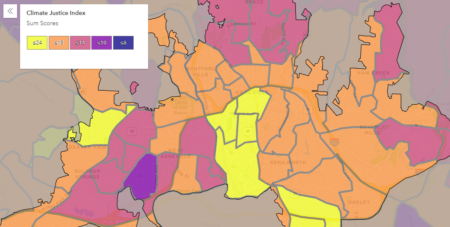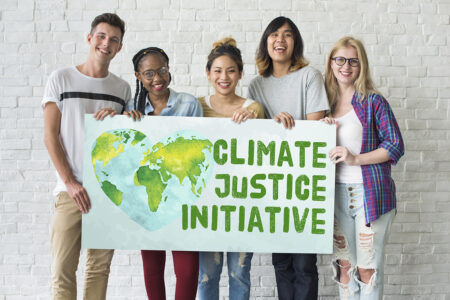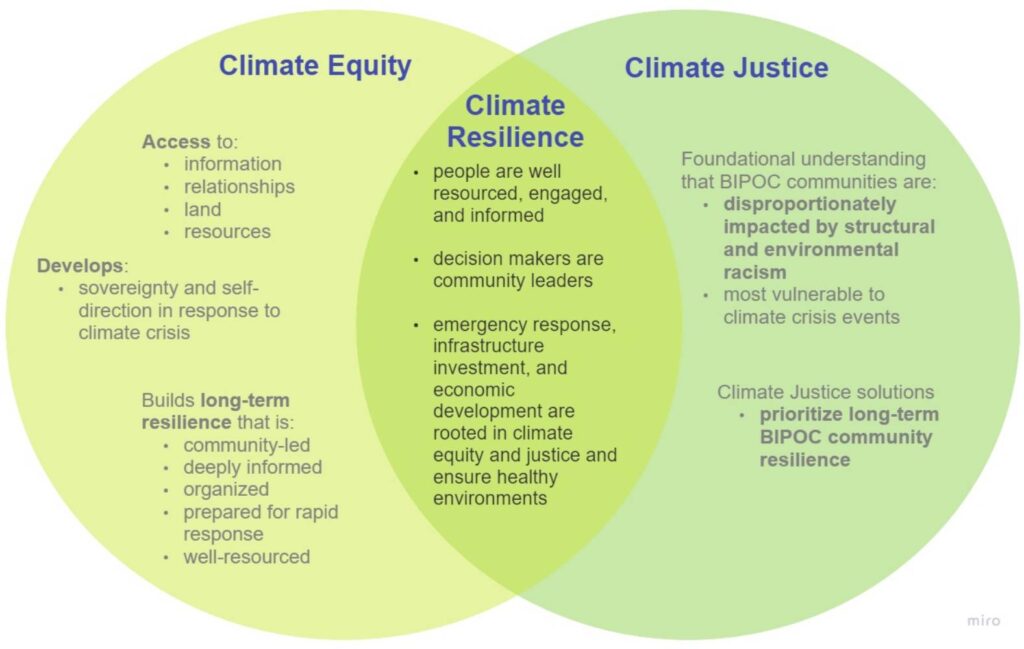Following the Climate Emergency Declaration by Asheville City Council in January 2020, city staff have been exploring strategies to incorporate Climate Justice in city operations. Initial engagement in the Climate Justice Initiative sought out community expertise and leadership through interviews, story circles, and lived-experience sharing. This expertise informed tools, priorities and strategies that are being employed to shape and inform city projects.
In the past year the Sustainability Department has been working closely with project managers from across the organization to evaluate opportunities to incorporate Climate Justice into organizational work plan projects. Through the City’s work planning process, sustainability and climate impacts were incorporated into the citywide project management tools and templates. Utilizing the new Climate Justice Screening Tool, team members are asked to dig deeper into opportunities to advance Climate Justice, identify options to avoid unintended negative consequences, and document areas where further resources could advance Climate Justice through the project.
The City of Asheville provides diverse core services, community planning, and public programming to residents and visitors. Organizational work plan projects reflect this diversity of work. The initial year of Climate Justice Screening Tool implementation provided an opportunity to better understand how different projects can and should interact with Climate Justice and sustainability planning. While all projects have potential touch points with key climate and sustainability focus areas such as carbon emissions, equitable and respectful community engagement, climate resilience, renewable and efficient energy considerations and more, some projects have more opportunities for impact and implementation.
In fiscal year 2022/2023 (FY23), 34 project teams from 13 different departments completed the sustainability project planning process. This process includes sustainability staff review and technical assistance to support the completion of a sustainability section in planning documents and Climate Justice Screening Tool as requested. 20 projects completed Climate Justice Screening Tools, 14 were exempt due to the nature of the project or stage in implementation.
Working directly with departments during project scoping and implementation planning provides a pathway to lift up and enhance sustainability components including Climate Justice. One example of a FY23 project with notable opportunities to advance Climate Justice activity alongside recommended actions from the Municipal Climate Action Plan (MCAP) is the “Inclusive and Accessible Government” project led by the Communication and Public Engagement (CAPE) Department. This project not only will lay important groundwork for Resilience Hub planning (MCAP activity #19) in collaboration with community members through the upfitting of public spaces initiative, but can also effectively engage frontline communities through community engagement academy re-development.
As we launch into fiscal year 2023/2024 the project team continues to evaluate and improve processes, tools, and technical assistance. Based on feedback from project managers and key takeaways from the pilot year of technical assistance the project team identified and began to carry out next steps for ongoing improvement including:
- Incorporated Climate Justice Data Map earlier in planning stages to leverage visual data for project scoping and planning
- Revised Climate Justice Screening Tool to provide more appropriate pathways for projects in planning/scoping versus implementation phases
- Revised Project Charter planning document to make supportive tools such as the Climate Justice Data Map and Screening Tool Guide more accessible and to better illuminate MCAP, Climate Justice, and overall sustainability themes
- Recommendation to collaborate more closely with Equity and Inclusion staff to incorporate core concepts from both the Climate Justice Screening Tool and the Climate Justice Initiative Final Report into departmental and organizational work plans
- Recommendation to migrate engagement focused Climate Justice Screening Tool questions into CAPE Communications and Engagement Planning tools and processes
While the focus on continuing to incorporate Climate Justice into City operations is ongoing, the Sustainability Department is also looking forward to also working on external facing projects as the City works to refresh climate resilience resources in collaboration with community partners. Visit the Climate Justice Initiative webpage or sign up for the Sustainability Newsletter for opportunities to engage, inform, and take up leadership roles in this project!

